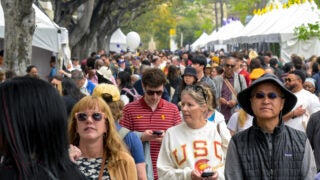9/11 first responder and social work professor inspires students around the world
Combat veteran Laura Owen has an enthusiasm that rubs off on her students at USC, even if they’ve never met her in person.
When social work professor Laura Owen is talking, it’s hard not to get completely absorbed. Like when the former U.S. Air Force captain tells the story of responding to 9/11.
“Do you remember the show M.A.S.H.?” she asks, referring to the 1970s and 1980s CBS show. Well, that’s what she was doing, part of a combat support hospital that arrived outside New York City in the wee hours of Sept. 12 to help those wounded in the attack on the twin towers.
“The injuries people sustained – they were emotional injuries,” said the trained social worker, noting the busiest people weren’t doctors and surgeons but social workers, psychologists and chaplains.
Stationed on a base since she joined the Air Force in 1999, her position hadn’t been much different than a civilian social worker up until that point. But 9/11 changed that. It was her introduction to military service.
“It absolutely changed the trajectory of my career and who I am,” Owen said.
Weeks later, President George W. Bush announced the deployment of troops to Afghanistan. Owen would be among the first deployed to an air base in Oman, to a mobile medical unit where she would do mental health work.
A former Peace Corps volunteer, she never saw herself as the military type. But her husband, who she married right after graduate school, had always wanted to serve.
“I could never stay at home and be an officer’s wife while my husband had these great adventures,” she said. She joined with him. Plus, it was peacetime.
“I couldn’t imagine a social worker deployed to war,” Owen said, an adjunct assistant professor at the USC Suzanne Dworak-Peck School of Social Work, who teaches in its online master’s program. “It turned out to be the biggest event in U.S. history.”
The value of military social work
After serving more than three years, she moved to Washington, D.C. for a few years before settling down in San Diego in 2009. Since then, she’s thrown herself at veterans issues.
She researched the connection between mental health and military deployment, studying both the invasions of Afghanistan and Iraq, and worked as a researcher for the the Veterans Affairs San Diego Healthcare System. She co-founded San Diego-based nonprofit American Military Muscle, which provides rehabilitation and mental health services to combat veterans in the area.
She realized veterans were a microcosm of the marginalized populations she cared about.
“If you care about kids, abused children, join the military,” she said. “If you care about women’s issues and sexual trauma, that happens in the military. Everything you see in the civilian population – mental illness, addiction, family violence – it happens in military populations too.”
Oftentimes youth who grew up in difficult circumstances see the military as a way out. They can benefit from the GI Bill and go to college or buy their first home with a Veterans Administration loan, she noted.
“In my own family, that has certainly been true,” she said. “My maternal grandfather was a descendant of slaves. He and his brothers joined the military, one in each branch of service. The career success [my grandfather] found in his Army career solidified his place in the American middle class. I think that’s a common story, particularly now that we have an all-volunteer military.”
Connecting with students virtually
Owen has been teaching at USC for eight years, including courses on leadership, policy and advocacy. Students say her enthusiasm for her career is infectious.
“We would all agree she’s the greatest instructor we’ve ever had,” said Vanessa Reiser, who graduated with her master’s in social work in 2016. “It’s a lot of admiration to have for a person I’ve never met in person.”
Owen hasn’t met most of her students in person because she teaches online through the school’s virtual academic classroom. Her students are all over the world, including Canada, Germany, Korea and Tallahassee, Fla.
“We would all agree she’s the greatest instructor we’ve ever had.”
Vanessa Reiser, Owen’s former graduate student
“Because classes are offered on Pacific Time, I’ve also had a handful of students log into class at 2 a.m. their local time because they were so committed to getting that Trojan diploma,” she said. “When I see the lengths my students will go to get their MSW from USC, it makes me want to be a better professor for them. I show up and give everything I’ve got because they show up and give everything they’ve got.”
For Owen, it’s the only way she could teach, since her work schedule wouldn’t allow her to commute from San Diego to Los Angeles regularly. And for students, it’s exposure to someone they might never meet any other way, a mentor who has exciting stories and practical advice, greeting them via their screens – sometimes in the middle of the night.
To connect with students through a screen takes a certain personality and Owen is built for it, says June Wiley, who oversees the online program.
“There’s a fair amount of showmanship in my teaching,” Owen said. “I tend to teach big. I have salty language. I always have. I think I can get away with it because I’m a combat veteran.”
Social work beyond therapy
In social work, like many caring professions, burnout or “compassion fatigue” is common, she said. Because of that, she’s straight with students.
“The pay isn’t always good and the clients aren’t always particularly receptive and appreciative,” she said. “I’ve been very lucky in my career in that I’ve never burned out.”
A big tip: play to your strengths. She knows from personal experience.
“I thought I would be a brilliant clinician,” she said. “I turned out to be terrible at it.”
In a one-on-one therapy setting, she wanted to fix things – which is the worst approach, she said. Instead, she followed what she was good at: advocacy, management and fixing institutional problems.
The advice hit home for Kristal Ibrahim, who graduated from the master’s program in December. She had planned to become a therapist but wasn’t enthusiastic about it.
“It’s not like I’m waking up in the morning rubbing my hands together,” she said. “It just opened my eyes to what social work could be beyond therapy. You don’t have to be a clinician if that’s not for you.”
When it came time for her internship placement, Ibrahim opted against a clinical setting. She instead interned in cause marketing, which is using marketing tools like social media to get the word out about social issues. In doing so, she found a possible career path.
“I would love to do cause marketing,” she said. “I’m kind of artistic and I found the opportunities to make memes and infographics a form of self expression for me, while getting the word out on causes that are important to me as a social worker.”
Inspiring passion in policy
And even though Owen isn’t in the classroom with her students, she’s accessible. Regardless of time zone, they have access to her cellphone, to call or text.
“They text me at 9 at night or 4 in the morning,” she said.
Sometimes it’s about assignments but sometimes it’s also advice about their professional or personal lives, since many of the students juggle jobs with the course load. She’s comforted students who’ve experienced personal tragedies. She’s also talked them through workplace issues or when they’ve lost a patient to suicide.
Her passion for certain issues, such as policy work, has rubbed off on her students as well.
Simon Parker, a student based in New York but originally from England, wasn’t too interested in American politics. But Owen’s policy class got him thinking. It was around the 2016 election when immigration was – and continues to be – a divisive issue. The formerly politically apathetic Parker decided to take a trip to Nogales, Ariz., to see what was happening at the border firsthand. Owen gave him tips on who to meet and where to go. He ended up accompanying a soon-to-be Jesuit priest to a shelter on the Mexico side of the border.
“She inspired me to do that,” he said. “Her class was the most useful class I took – by far. It was a bit life changing.”



